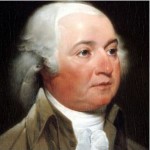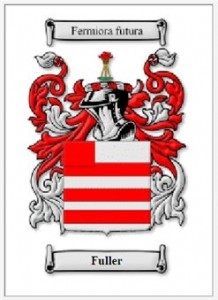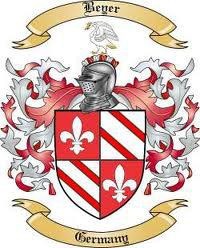shakespeare
 Before women could vote, the first lady in our White House was primarily there to handle the household staff, entertainment, and just look pretty beside her husband…the President. Of course, this was during the age when it was thought that women simply couldn’t handle the serious political information that it took to run a country. These days, women would howl in protest at the thought of being placed in the pretty, but incapable box. In reality, the women back then didn’t like it much either, but it seemed that there was nothing they could do about it…at least, not at the time. Still, even though women were not allowed to vote or have a political voice, there were men who valued the opinions and insights of their wives. One of those men was President John Adams. I suppose that Abigail Adams could have had one of those amazing minds, and that would seem to be the case from the different topics of discussion between John Adams and his wife, but the sequence of events that took place on this day March 7, 1777, is nothing short of amazing.
Before women could vote, the first lady in our White House was primarily there to handle the household staff, entertainment, and just look pretty beside her husband…the President. Of course, this was during the age when it was thought that women simply couldn’t handle the serious political information that it took to run a country. These days, women would howl in protest at the thought of being placed in the pretty, but incapable box. In reality, the women back then didn’t like it much either, but it seemed that there was nothing they could do about it…at least, not at the time. Still, even though women were not allowed to vote or have a political voice, there were men who valued the opinions and insights of their wives. One of those men was President John Adams. I suppose that Abigail Adams could have had one of those amazing minds, and that would seem to be the case from the different topics of discussion between John Adams and his wife, but the sequence of events that took place on this day March 7, 1777, is nothing short of amazing.
While John, who was at the time, a Continental Congressman, was in Philadelphia with the Continental Congress, and Abigail was in Braintree, Massachusetts at the family farm, he wrote her three letters, and received two letters that she had written in February. The correspondence between the two, was quite remarkable, and in all numbered 1,160 letters. They covered topics ranging from politics to military strategy, and from household economy to family health. John could see the value of his wife’s mind in all his life’s work, but probably the most in his presidency…other than family, that is. In many ways, it is sad to think that the minds of so many amazing women have gone untapped when it comes to the political arena. Of course, not all minds, male or female, intelligent or not so intelligent, can be said to have a good grasp of the important things necessary to run a nation, and keep it from derailing…as we have seen in recent years. Our nation needs people who understand how a Constitutional Republic works…and sadly, many don’t. But John Adams knew how important our Constitution was and always would be…as did his wife, Abigail. John was probably on the forefront of modern thought, in that he saw in his wife the ability to think politically, militarily, economically, as well as all of the thoughts any wife and mother has for her family. John and Abigail were not alone either. They were among the few people of that time, who saw women as intellectual and emotional equals.
In his letter, John mentioned that he felt saddened by the move of the capital to Baltimore, saying “This City is a dull Place, in Comparason [sic] of what it was. More than one half the Inhabitants have removed to the Country, as it was their Wisdom to do—the Remainder are chiefly Quakers as dull as Beetles. From these neither good is to be expected nor Evil to be apprehended. They are a kind of neutral Tribe, or the Race of the insipids. By contrast, Adams described the Loyalists, who prepared their Minds and Bodies, Houses and Cellars,  to receive General William Howe should he attack, as a Pack of sordid Scoundrels male and female.” Abigail had written the letters he received on this day, in February, in which she spoke of the difficulty of corresponding during war, but also spoke of the lack of military fervor demonstrated by the New Englanders around her. I’m sure there was a weariness among the people. She wrote that she awaited greater patriotism, greater prosperity and future correspondence from her beloved husband to his devoted Portia, a nickname John had give her likely in reference to the intelligent and devoted heroine of Shakespeare’s Portia in The Merchant of Venice. These words and the respect her husband had for his wife and her mind were very unusual in a time when women were placed in the pretty, but incapable box.
to receive General William Howe should he attack, as a Pack of sordid Scoundrels male and female.” Abigail had written the letters he received on this day, in February, in which she spoke of the difficulty of corresponding during war, but also spoke of the lack of military fervor demonstrated by the New Englanders around her. I’m sure there was a weariness among the people. She wrote that she awaited greater patriotism, greater prosperity and future correspondence from her beloved husband to his devoted Portia, a nickname John had give her likely in reference to the intelligent and devoted heroine of Shakespeare’s Portia in The Merchant of Venice. These words and the respect her husband had for his wife and her mind were very unusual in a time when women were placed in the pretty, but incapable box.
 For many people researching the family history means looking for things like famous ancestors, family occupations, historical locations, and eventually the family crest, also known as the Coat of Arms. The problem with the family crest is that there are so many, and the process to make a legal claim to one is difficult, because the right to bear arms in the legal sense of a coat of arms, must be researched and proven through attested Genealogical records. Of course, this doesn’t mean that people can’t pick out a crest that bears their name and use it, even without the legal documentation. They can be displayed as decorative reproductions, derived only from the association with your name. That use, while legal in the sense that you are not committing a crime, is not the legal right to bear arms that is normally associated with the crest.
For many people researching the family history means looking for things like famous ancestors, family occupations, historical locations, and eventually the family crest, also known as the Coat of Arms. The problem with the family crest is that there are so many, and the process to make a legal claim to one is difficult, because the right to bear arms in the legal sense of a coat of arms, must be researched and proven through attested Genealogical records. Of course, this doesn’t mean that people can’t pick out a crest that bears their name and use it, even without the legal documentation. They can be displayed as decorative reproductions, derived only from the association with your name. That use, while legal in the sense that you are not committing a crime, is not the legal right to bear arms that is normally associated with the crest.
Sometimes, for those who are very fortunate, the family coat of arms might be found in a grandparent’s attic, but most of us will not discover our true coat of arms in this manner. Because of the difficulty in locating the necessary information to claim a legal right to a family coat of arms, most people just don’t bother with this part of a full family history. According to LG Pine, author of Heraldry And Genealogy, “At the onset, there is a curious fact in the relationship between the two subjects. While students of Heraldry do take to Genealogy, and acquire a considerable knowledge of it, those who begin as genealogists seldom if ever take any interest in Heraldry. This is most unfortunate, because the two subjects are necessarily related.” I suppose this is true, but once you have stumbled upon a family coat of arms in your research, like I did a few years ago, you simply do become intrigued.
Nevertheless, I had no idea about the legal right to bear arms until I was doing some research into the coat of arms of the Leary side of Bob’s family the other day. I had found several family coats of arms for the Spencer, Byer, Pattan, Fuller, and Schulenberg sides of the family, and planned to look for some of the others in the near future. While I will still do that, I have to wonder about the accuracy of the ones I have, and just how  difficult it will be to verify their validity. I can see that I will need to do some research on just how to move forward on this matter in the correct way.
difficult it will be to verify their validity. I can see that I will need to do some research on just how to move forward on this matter in the correct way.
The biggest obstacle I see in researching Heraldry or Genealogy is that the spelling of names changes. Whether it is because the person moved to a new nation and was made to change their name or spelling, or like many people do with their first names these days, the person experimented with the spelling of their last name. William Shakespeare was known to spell his last name Shakespeare, Shakespere, Shakespear, Shakspere, and Shaxpere. So to the researcher, I suppose it would be a matter of searching for documentation under multiple different spellings. You can see that the further you get into a search, the more difficult it is to determine the accuracy. So now apply that to the search concerning the legal right to bear arms, and I think you might have the answer as to why so many people avoid this area of research altogether.

